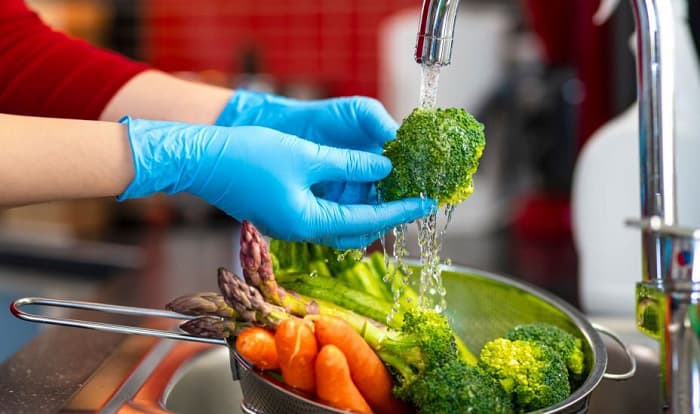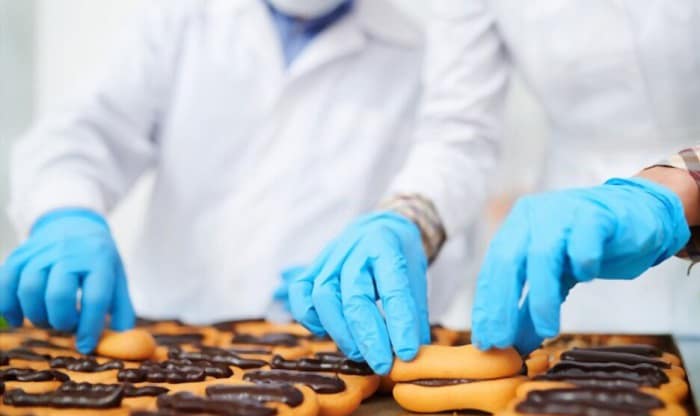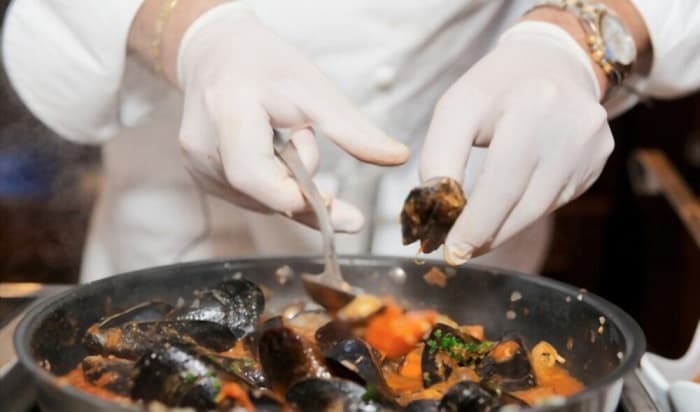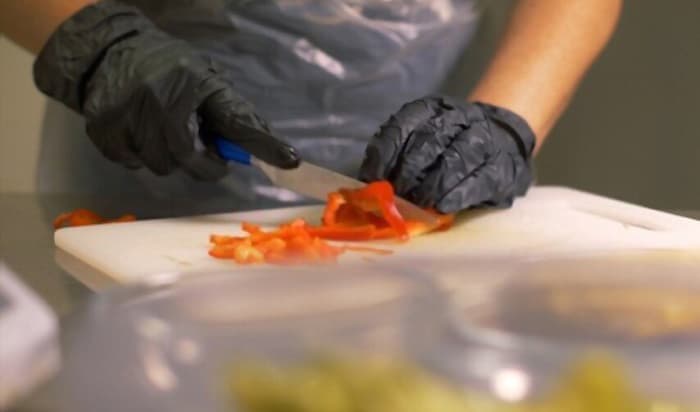According to the FDA, foodborne illnesses affect 48 million Americans annually, resulting in over 3,000 deaths. The number raises the alarm for safe food preparation and handling, which can simply be achieved by wearing disposable gloves.
However, what kind of single-use gloves should you wear? Are nitrile gloves food safe? The short answer is yes. Nitrile food grade gloves are some of the best for food handling because they are resilient, oil-resistant, additive-free, and allergy-safe.
Table of Contents
Are Nitrile Gloves Safe for Food Prep?
While there are endless disposable cooking gloves options, food safe nitrile gloves are the most recommended. The material is suitable for latex-allergic people, free of additives during the manufacturing process.
Firstly, nitrile gloves are ideal for workers with latex skin allergies. Its name stands for nitrile butadiene rubber, which is a type of latex-free synthetic rubber.
Secondly, the process of making nitrile gloves is additive-free. To create nitrile gloves, manufacturers first mix two synthetic polymers – acrylonitrile and butadiene.
The mixture is then blended and stabilized into a consistent compound. Finally, hand-shape molds are dipped into the compound and dried to form nitrile gloves. During this process, manufacturers might add little to no chemical additives.
That is why nitrile gloves are preferred in laboratories and sterilized environments. Similarly, the material won’t contaminate food with potentially harmful allergens or chemicals.
Lastly, nitrile butadiene rubber is naturally waterproof and oil-resistant. Chefs can use nitrile gloves for cooking, garnishing, and chopping oily food without worrying about penetration.
However, note that not all nitrile gloves are designed for food preparation. When choosing nitrile gloves for food handling, you should look for the following characteristics:
- FDA and HACCP approved
Rubber handwear must meet FDA regulations to be certified as food grade disposable gloves. According to the FDA’s CFR Title 21, the glove materials must be sanitary, impermeable, and safe for food preparation and packaging.
Thus, you should always look for mentions of FDA or HACCP on a brand’s website before purchasing their products. Doing so guarantees that you are using safe gloves for handling food.
- Graded for medical and food use
Nitrile gloves can be medical-grade, food-grade, or industry-grade. The three types have the same source materials but differ in thickness, strength, and overall quality.
Though the FDA approves all of them for food handling, medical-grade gloves are more resilient and durable than the rest.
So, food grade vs medical grade gloves, which one is better? The biggest difference is medical gloves must undergo more rigorous tests and meet higher standards.
In general, food grade nitrile gloves provide enough protection. But if you want to take a step further at food safety, you can opt for medical or examination gloves.
- Powder-free
Nitrile gloves can be powdered or powder-free. The added powder is fine cornstarch, which intends to ensure easier donning and doffing. The powder also helps absorb sweat and moisture, keeping the wearers’ hands dry through extended wear.
However, cornstarch powder poses many potential health risks, such as respiratory inflammation, irritations, and allergies.
Besides affecting the wearers, the powder can spread onto food and cause allergies in the customers. Thus, the safest nitrile food service gloves should be powder-free.
Why Are Gloves Essential for Food Handling?
It’s been known for a long time that bare-hand contact with food can transmit foodborne illnesses from the cook’s hands to the food. The pathogens can spread even when the workers don’t realize they are sick.
Handwashing alone is not enough to prevent pathogen transmissions. Thus, workers should wear FDA approved food handling gloves when touching ready-to-eat food and preparing raw materials.
Gloves can also protect employees from foods that cause skin irritations, such as pepper and onion.
Frequently Asked Questions
Blue vs black nitrile gloves: What is the difference?
Nitrile gloves are available in many shades: white, blue, black, purple, and pink. But the colors do not affect the quality of the gloves.
White and blue nitrile gloves are often used in medical settings because they allow caregivers to spot blood, bodily fluids, and deterioration more easily.
Meanwhile, black and dark-colored rubber gloves are often worn by tattoo artists and mechanics since they hide the color of inks, oil, and greases.
You can use any glove color to handle food, provided that the pair is FDA-approved. In some facilities, workers color code nitrile gloves to distinguish their sizes and prevent cross-contamination.
Are nitrile gloves toxic to humans?
No, nitrile is not toxic to humans, but the material is not eco-friendly. The original material for creating nitrile rubber is crude oil, which is non-renewable and can cause negative impacts on the environment upon collection.
In addition, as a synthetic material, nitrile is non-biodegradable. It can take hundreds of years for a pair of nitrile gloves to biodegrade in a landfill.
Reasons why nitrile gloves are used for cooking
Nitrile gloves are well-known for their cleanliness and strength. Employees can wear them when working with food processing machinery without worrying about glove deterioration. They are also contaminate-free and additive-free.
Are nitrile gloves impermeable?
Nitrile has higher chemical resistance than latex and vinyl. However, the material is not impermeable. Strong-grade chemicals can still pass through and deteriorate it. You should also change gloves after four hours of use, regardless of the material.
Are vinyl gloves food safe?
Yes, they are. Vinyl gloves are safe, comfortable, and latex-free. They are available in multiple thicknesses and can be used for nearly any task. Even though they are not as resilient as nitrile gloves, they are softer and more cost-efficient.
Related: Check out this quick comparison between vinyl vs nitrile gloves right here.
Are latex gloves food safe?
Since latex poses a risk of allergy for the wearers and customers, the answer is no. You should use nitrile gloves instead.
Conclusion
In conclusion, the answer to “Are nitrile gloves food safe?” is yes. In fact, nitrile is one of the safest materials for food handling. As long as the pair is FDA-approved, food or medical-grade (and even industrial-grade), plus powder-free, you can wear it for the task.

Veronica is our content editor. She is a talent in delivery. Her main work is editing and writing articles that are both informative and simple to follow. She is in charge of synthesizing our understanding of what personal protection equipment (PPE) is needed in each job, how to best apply it, and how to visualize that equipment.





